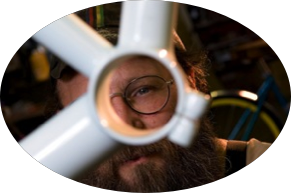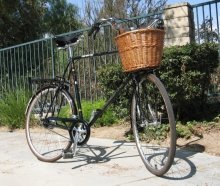I have admired the bicycles made by BCW for many years, so Stephen Bilenky was one of the first people I contacted for an interview when I started “Cycloculture.” He graciously agreed, and I e-mailed him a list of interview questions. Most folks simply send me back a list of answers, which I print in my blog. Bilenky, on the other hand, pondered the questions for a few weeks then worked with me to arrange two telephone interviews so we could discuss his answers in depth. Throughout the process, he struck me as an intelligent, thoughtful man, in the sense that he carefully considered every question and gave me real, in-depth answers, not the “talking points” one sometimes gets from a publicist who is more interested in spreading hype than providing information (not that I have talked to any PR drones for Cycloculture as of yet). As a result, these two articles are a bit more conversational, perhaps a bit more personal. Enjoy.
Stephen Bilenky
When I asked Bilenky what he had learned in his three-plus decades building bicycles, he started off by saying, “Fillet braze quickly and shapely.” He went on to talk about the importance of both solving and avoiding fabrication problems. “Learn how to do the craft well. Learn how to fix mistakes. Learn how to avoid mistakes.”
He stressed the importance of using machine tools properly, and I knew what he meant. Almost anyone can grab a file and do a “good enough” job of shaping tubing after a bit of practice, but in order to perform these operations quickly, accurately and in large quantities, machine tools are required. Currently BCW uses only standard mills, lathes, etc. They contract out some work when using automated CNC machines makes more sense. Bilenky also stressed the importance of proper metal finishing. You need the right expertise and the right equipment for preparing surfaces for plating, polishing, painting, etc.
Members of the BCW crew that brings these bikes to life
He went on to talk about the nuts and bolts of running a design/manufacturing business. Computers are critical not only to design bicycles and communicate custom designs to customers, but also for running a business in general. He discussed the difficulties involved with coordinating multiple projects. Every day, he must juggle tasks such as building frames, granting interviews, training employees, preparing for various shows and events, and a list of other responsibilities. Over the years, he has learned to balance these jobs and keep BCW running as smoothly as possible. Critically linked to this balance is the art of getting along with people. Bilenky talked about the importance of working well with customers, suppliers and employees.
At that point, I got into more specific details of BCW-built bicycles. On the BCW website, Bilenky calls the Metro 5, a bicycle Bilenky originally built under the “
A Bilenky Metro Luxe 14B
He went on to talk about a
Bilenky told me that BCW manufacturing consists of a good mix between production bikes and one-offs. BCW “Eco” series frames start at $950. The “Signature” series frames top out at $2500. I asked Bilenky to walk me through the differences. “We try to cater to a spectrum of buyers that goes from basic steel handbuilt steel frames to a one of a kind commission. Our different price levels represent a combination of design and finish options, material, construction method, and fork. The $950 that you mention is a tig-welded track frame, no braze-ons, no fork included, built to our stock plans and tubing. As we go up to the Deluxe level there is more customer input and customization available - forks go from production to handbuilt, material is upscaled, lugged and fillet brazed construction is available. The signature represents a finely detailed and hand finished sculpture in motion, fine tuned to the requirements of each customer.”
A single speed, lugged Bilenky cyclo-cross bike
Recently, BCW introduced the “Artisan” line, which is a step up from the “Signature” series. Frame prices start at “$3500+. Their website describes the “Artisan” frames as “Our ‘sculpture-in-motion,’ features one-of-a-kind metal work that distinguishes each frame as a unique creation. Material specifications are determined by the riders' measurements, style, and intended use. Material is chosen from the best the world has to offer -
I went on to ask Bilenky about my favorite element of BCW production, their cargo bikes. He told me that they had been building the cargo bikes for ten years, and that their cargo bike business was booming. They are dramatically increasing their cargo bike offerings, with models including a shorter wheelbase version which still has a steering linkage, a rear-loader with a big cargo box in back, and a front-loader with a 40cc two-stroke engine.
A short wheelbase Bilenky front loader
He is also “contemplating” manufacturing pre-made attachments for the cargo bikes, such as standard boxes, lockboxes, waterproof containers, etc. “We need to be in the 'solutions business,'” he told me, “Is that [cargo bike accessories] going to be the next big thing?”
Bilenky cargo bike with large front box
Bilenky and I chatted for quite a lot longer. In the second and final article on this interview, I will talk about some of BCW’s future plans, new models they will be introducing soon, Bilenky’s thoughts on the role of the bicycle in today’s transportation picture, and, of course, what he likes for breakfast. Stay tuned.
Read the second half of this article here.










No comments:
Post a Comment